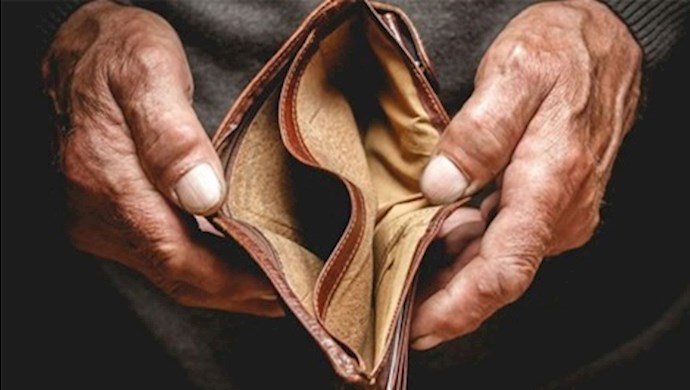Analysis by PMOI/MEK
Iran, January 15, 2021—The government of Hassan Rouhani and the Majlis (the parliament) recently had a row on passing the 2021 budget proposal. But at the core of the dispute is not how to better serve the people and the country but how to split the spoils obtained from imposing more heavy taxes on the people.
The Majlis warned Rouhani that the expected oil exports revenue in the budget would not reach the projected figures in the proposed bill and that he must relinquish the idea of exporting more than 2 million barrels of oil per day.
Subsequently, the government and Majlis agreed to remove the fake oil export revenue as a funding source in the budget bill. Instead, they agreed to transfer the burden to the people through taxes, duties and tolls.
On January 4, 2020, Rouhani admitted: "To run the country, we rely mostly upon taxes and duties and such. In any case, running the country relies on the taxes.” (state-run Khabar TV network)
It is crystal clear that the government financing out of the pockets of the people benefits regime-affiliated people and institutions.
On January 6, 2021, state-run Arman daily ran a report headlined “Tax system benefited plunderers,” in which it wrote: “The Majlis seeks to reduce oil sales, also possibly lower the government bonds and raise the price of currency from 115,000 rials mentioned in the bill to 250,000 rials. These moves actually mean an ultimate economic and social crisis for the country. The main problem is that our tax system is in the control of looters and people who benefit from these economic policies.”
On the same day, the state-run Donyay-e Eghtesad noted some of the drawbacks of Rouhani's 2021 budget bill, including the heavy tax burden on some specific classes. “It seems that new taxpayers have not been identified and tax evasion has not been contained. Meanwhile the heavy tax burden is placed on the shoulders of officially-registered institutions, entrepreneurs, employees and workers.”
Regarding high taxes on strained and small businesses, Javad Nikbin, a member of Majlis, said: “Why don’t you impose taxes on empty houses and luxury cars? Why don’t you impose tax on special goods. Do taxes have to be levied only on teachers, workers and employees? Why don’t you impose taxes on those who have astronomical earnings?” (December 27, 2020, state-run Majles news agency)
Rasoul Falahati, the Friday prayer leader of Rasht, admitted: “A villager or a small retail store owner has to pay his taxes as fast as possible, and if he does not manage to pay his tax, the criminal courts, judiciary and police stations will get involved.” (December 26, 2020, state-run Baran TV)
Raising the official exchange rate and skyrocketing high prices are other initiatives meant to increase government revenue.
The budget Commission of Majlis passed the rise of the basic exchange rate in the budget proposal to 175,000 rials.
In case of final ratification, the prices especially in terms of the essential goods needed for the people's table, will surely see a rampant rise, which will definitely leave the people in even harsher conditions.
In a piece on the state-run Sharq daily, economist Farshad Momeni warned on January 5, “The power and wealth mafia insinuates that there is no other way to save the country other than raising taxes. This is a great deception, and if some parts of the power structure have interests in this dangerous game, they must be vigilant, because they will be jeopardizing their own survival.”
While Rouhani continues to insist that the only way to solve the country’s problems is to impose more taxes on the public and the budget bill is putting more pressure on the people, what the budget contains in terms of public service is negligible.
On January 6, 2021, state-run Samt daily wrote: “In the budget proposal, the fund resources for programs to reduce the narcotic sales and consumption in the country amounted to 4.59 trillion rials, which 11 percent lower than the current year. The budget has allocated 3.52 trillion rials to renovate worn-out structures, areas in critical condition and suburbs. This figure is a 13-percent decrease compared to the previous budget bill.”
In addition to public resources, the banks and state-owned companies regarding the worn-out and inefficient urban structure sector will be provided for supplementary 1.02 trillion rials, which has decreased by 97 percent compared to the current budget bill.
As the mentioned report admitted, the budget bills in this regime acts as a tool to finance and make benefits to the most oppressive bodies in the regime like security services and the Revolutionary Guards (IRGC) and institutions affiliated to the office of regime supreme leader Ali Khamenei. These budget bills leave the majority of the people in poverty, suffering from deprivation and struggling to make ends meet.
However, Rouhani’s government and the Majlis are seeking to levy the brunt of the tax burden on the very deprived people so that officials and regime-affiliated institutions and the government benefits from the budget.
Despite the grave economic condition which the majority of the people are experiencing, the regime’s officials keep stating demagogue comments erupting public outrage. Rouhani in a statement said: “The government considers paying attention to the living condition of the people on low income as the red line in the budget proposal!” (January 6, 2021, state-run IRNA news agency)





